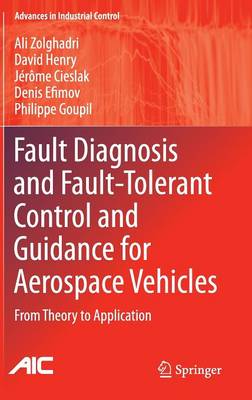Advances in Industrial Control
1 total work
Fault Diagnosis and Fault-Tolerant Control and Guidance for Aerospace Vehicles
by Ali Zolghadri, David Henry, Jerome Cieslak, Denis Efimov, and Philippe Goupil
Published 30 September 2013
Fault Diagnosis and Fault-Tolerant Control and Guidance for Aerospace demonstrates the attractive potential of recent developments in control for resolving such issues as flight performance, self protection and extended-life structures. Importantly, the text deals with a number of practically significant considerations: tuning, complexity of design, real-time capability, evaluation of worst-case performance, robustness in harsh environments, and extensibility when development or adaptation is required. Coverage of such issues helps to draw the advanced concepts arising from academic research back towards the technological concerns of industry.
Initial coverage of basic definitions and ideas and a literature review gives way to a treatment of electrical flight control system failures: oscillatory failure, runaway, and jamming. Advanced fault detection and diagnosis for linear and linear-parameter-varying systems are described. Lastly recovery strategies appropriate to remaining actuator/sensor/communications resources are developed.
The authors exploit experience gained in research collaboration with academic and major industrial partners to validate advanced fault diagnosis and fault-tolerant control techniques with realistic benchmarks or real-world aeronautical and space systems. Consequently, the results presented in Fault Diagnosis and Fault-Tolerant Control and Guidance for Aerospace, will be of interest in both academic and aerospatial-industrial milieux.
Initial coverage of basic definitions and ideas and a literature review gives way to a treatment of electrical flight control system failures: oscillatory failure, runaway, and jamming. Advanced fault detection and diagnosis for linear and linear-parameter-varying systems are described. Lastly recovery strategies appropriate to remaining actuator/sensor/communications resources are developed.
The authors exploit experience gained in research collaboration with academic and major industrial partners to validate advanced fault diagnosis and fault-tolerant control techniques with realistic benchmarks or real-world aeronautical and space systems. Consequently, the results presented in Fault Diagnosis and Fault-Tolerant Control and Guidance for Aerospace, will be of interest in both academic and aerospatial-industrial milieux.
